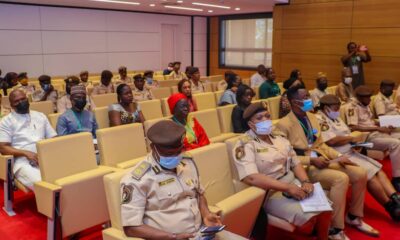Business
Rivers Fadama Disburses N17.2m To Farmers
Following the payment of the National Fadama III Counterpart Fund by the Rivers State Government as part of successes made by the Chibuike Amaechi-led administration in Agriculture in the year 2009, the State Fadama III Co-ordinating office has disbursed the sum of N17.2 million to 25 farmer groups in the state.
The state Fadama co-ordinator, Mr. Kingsley Amadi, disclosed this in an interview with The Tide in his office at Rumuodomaya in Obio/Akpor local government area of Rivers State.
According to him, Fadama project is counterpart fund dependent, which implies that for any group, state, local government and community to benefit, it must pay its share of the counterpart fund, saying that over the years, non-payment of project counterpart fund has denied indigenes of this state a lot of benefits from both federal government and the World Bank.
He said that the World Bank in 2009 approved and released the sum of USD 250 million for funding of Fadama III in the 36 states including the Federal Capital Territory, out of which Rivers State was allocated the sum of USD 7.85 million, meaning that the project will inject the sum of over N1.2 billion into the state for the funding of agricultural activities in both the up and downstream sectors.
The co-ordinator noted that with the payment of the 2008/2009 counterpart fund by the state government which qualifies the state to benefit, the World Bank released the initial deposit of $600, 000 for disbursement to farmers in the state.
The fund according to him is expected to assist the state government alleviate poverty, increase food production and tackle the problem of unemployment and youth restiveness, adding that, the project will provide grants to finance capacity building, advisory services, input support, acquisition of productive assets to farmers, as well as rural infrastructure, such as roads, markets, culverts and small bridges. It will also support adaptive research and on-farm trials that will meet the needs of the farmers, he noted.
In fulfillment of these objectives the state co-ordination office has embarked on the grading of a 4.5 kilometer access road in Barako and a market in Deiiyoro, Gokana Local Government Area of Rivers State at the cost of N1.2 million, arrangement has also been concluded to grade another road at Ogbakiri in Emohua local government area, at the cost of N1.4 million as well as propose N1.06 million borehol in Umudioga, cold room project in Abonnema, Akuku-Toru LGA and training of Farmers Community based procurement, Amadi maintained.
Inspite of numerous achievements made in 2009, the state coordinator said the office was confronted with the challenges of the failure of some local government councils to pay counterpart fund of N2 million only to qualify them participate in the project, the inability of beneficiaries to pay the beneficiary contributions to enhance their disbursement and lack of mobility to monitor ongoing projects.
Business
Kenyan Runners Dominate Berlin Marathons
Kenya made it a clean sweep at the Berlin Marathon with Sabastian Sawe winning the men’s race and Rosemary Wanjiru triumphing in the women’s.
Sawe finished in two hours, two minutes and 16 seconds to make it three wins in his first three marathons.
The 30-year-old, who was victorious at this year’s London Marathon, set a sizzling pace as he left the field behind and ran much of the race surrounded only by his pacesetters.
Japan’s Akasaki Akira came second after a powerful latter half of the race, finishing almost four minutes behind Sawe, while Ethiopia’s Chimdessa Debele followed in third.
“I did my best and I am happy for this performance,” said Sawe.
“I am so happy for this year. I felt well but you cannot change the weather. Next year will be better.”
Sawe had Kelvin Kiptum’s 2023 world record of 2:00:35 in his sights when he reached halfway in 1:00:12, but faded towards the end.
In the women’s race, Wanjiru sped away from the lead pack after 25 kilometers before finishing in 2:21:05.
Ethiopia’s Dera Dida followed three seconds behind Wanjiru, with Azmera Gebru, also of Ethiopia, coming third in 2:21:29.
Wanjiru’s time was 12 minutes slower than compatriot Ruth Chepng’etich’s world record of 2:09:56, which she set in Chicago in 2024.
Business
NIS Ends Decentralised Passport Production After 62 Years
Business
FG To Roll Out Digital Public Infrastructure, Data Exchange, Next Year
-

 Politics5 days ago
Politics5 days agoRivers Assembly Resumes Sitting After Six-Month Suspension
-

 Featured5 days ago
Featured5 days agoPANDEF Hails Tinubu For Lifting Emergency Rule In Rivers
-
News5 days ago
KenPoly Governing Council Decries Inadequate Power Supply, Poor Infrastructure On Campus
-

 News5 days ago
News5 days agoFubara’s Return: Rivers Elders, Women Call For Unity, Hail Tinubu
-

 News5 days ago
News5 days agoFAAC Disburses N2.225trn For August, Highest In Nigeria
-

 News5 days ago
News5 days agoFG Ends Passport Production At Multiple Centres After 62 Years
-
Rivers5 days ago
RIVCHPP Mulls Plan For Universal Health Coverage In Rivers
-
Maritime1 day ago
Minister Tasks Academy On Thorough-Bred Professionals

